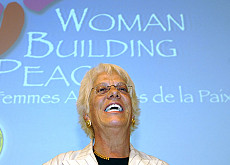Del Ponte slams Serbia over war criminals

Top United Nations war crimes prosecutor Carla Del Ponte continues to in effect block an agreement on closer ties between the European Union and Serbia.
The Swiss head of the International Criminal Tribunal for the Former Yugoslavia said Belgrade’s cooperation in efforts to hand over suspected war criminals remained insufficient.
“I confirm the situation today is better than it was a year ago. However, it is still too slow and not yet sufficient,” Del Ponte told EU foreign ministers in Luxembourg on Monday.
Serbia’s full cooperation with the tribunal is a key condition before Brussels will sign an initial agreement with Belgrade, paving the way for eventual EU membership.
“I cannot give a positive assessment of full cooperation until Ratko Mladic is arrested and transferred to The Hague,” said Del Ponte.
She said she was convinced that Serbia had the means to locate and arrest Mladic – the former Bosnian Serb military commander – believed to be hiding in Serbia.
As a result of Del Ponte’s briefing the EU held off initialling the new pre-membership association agreement.
European Enlargement Commissioner Olli Rehn said the EU would take into account the updated findings of Del Ponte when she returns from another visit to Belgrade at the end of this month.
Incentive
Diplomats were hoping the prospect of moving closer to EU membership would give Serbia more incentive not only to catch Mladic and other fugitives but also to cooperate in talks on the future of the breakaway province of Kosovo.
Last week the Serbian government offered a €1 million (SFr1.68 million) reward for information leading to the arrest of Mladic. The United States has already offered $5 million (SFr5.9 million) for his capture.
He is wanted on genocide charges over the 1995 Srebrenica massacre of about 7,000 Bosnian Muslims.
Del Ponte said there had been some progress on the delivery of documents she sought from Serbia as evidence, but requests for assistance were still outstanding.
“My staff is still denied access to crucial archives,” she added.
“Although there has been some activity in the efforts to locate the fugitives and identify networks protecting them, these actions were slow, irresolute and unsystematic.”
Milosevic
Over the past three years the number of suspected war criminals at large was reduced from more than 30 to just four.
They include Radovan Karadzic, the wartime Bosnian Serb political leader, as well as Goran Hadzic, a former leader of the Croatian Serbs, and Stojan Zupljanin, a wartime commander of Bosnian Serb police.
The former Yugoslav president, Slobodan Milosevic, was arrested in 2001 and extradited to The Hague to stand trial on charges including genocide. He died of a heart attack in his cell five years later.
Del Ponte, who has been chief war crimes prosecutor since 1999, is due to step down from the post at the end of this year to become Swiss ambassador to Argentina.
Last month she was honoured by the European federation of Soroptimist International, an organisation for business and professional women who provide volunteer service to their communities.
swissinfo with agencies
Carla Del Ponte is one of Switzerland’s best-known representatives in international institutions.
She was Swiss federal prosecutor until 1999 before her appointment by the UN as chief prosecutor for the former Yugoslavia.
Del Ponte, who was born in 1947, is expected to leave her post at the end of the year to become Swiss ambassador to Argentina.
The ICTY was established by Resolution 827 of the UN Security Council in May 1993.
Based in The Hague, it is the first international body for the prosecution of war crimes since the Nuremberg and Tokyo trials held after the Second World War.
The tribunal has jurisdiction over individuals responsible for genocide, war crimes and crimes against humanity in the territory of former Yugoslavia after January 1, 1991.

In compliance with the JTI standards
More: SWI swissinfo.ch certified by the Journalism Trust Initiative












You can find an overview of ongoing debates with our journalists here . Please join us!
If you want to start a conversation about a topic raised in this article or want to report factual errors, email us at english@swissinfo.ch.